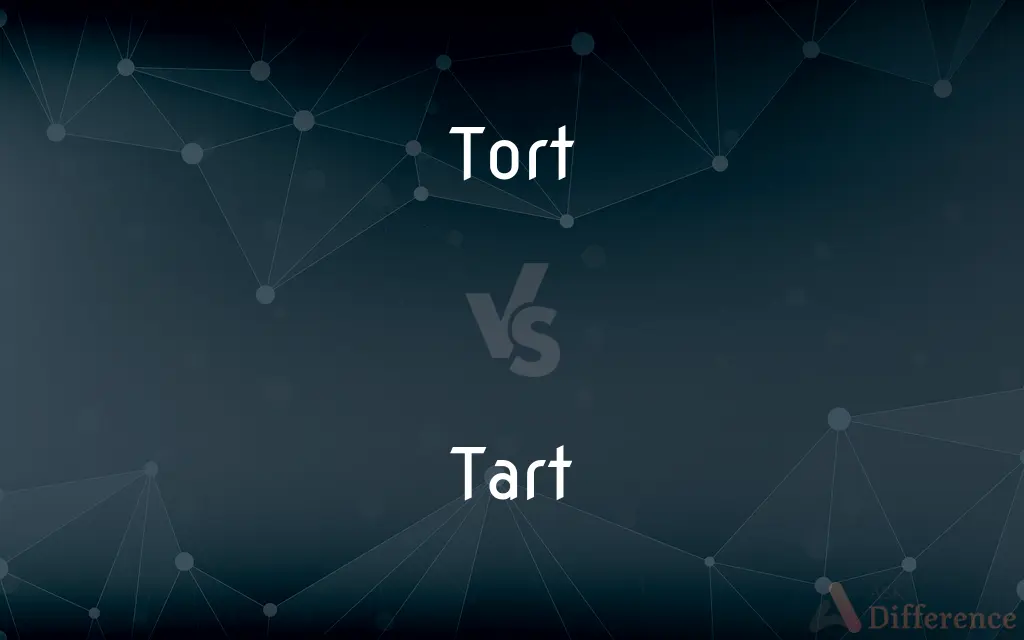Tort vs. Tart — What's the Difference?
By Fiza Rafique & Maham Liaqat — Updated on April 14, 2024
Tort refers to a civil wrong that causes harm and leads to legal liability, whereas a tart is a type of pastry with a firm crust and a sweet or savory filling.

Difference Between Tort and Tart
Table of Contents
ADVERTISEMENT
Key Differences
A tort in legal terms refers to an act or omission that results in injury or harm to another, resulting in civil liability. Conversely, a tart is a culinary dish known for its open-top crust and filling.
Torts are addressed in civil court, where plaintiffs seek compensation for damages incurred. In contrast, tarts are primarily found in bakeries and home kitchens, celebrated for their versatility in flavors and ingredients.
The concept of torts encompasses various categories like negligence, intentional torts, and strict liability torts, each with distinct legal implications. Tarts, on the other hand, can be classified by their fillings, such as fruit, custard, or chocolate.
In the study of law, tort law is crucial for understanding how non-criminal disputes are resolved in the justice system. Meanwhile, in culinary arts, mastering the art of tart baking is essential for pastry chefs focusing on European-style desserts.
Torts can result in compensatory and punitive damages, aiming to restore the victim's situation and deter future offenses. Tarts, however, aim to satisfy culinary tastes and are often enjoyed as part of a meal or as a dessert.
ADVERTISEMENT
Comparison Chart
Definition
A legal wrong leading to civil liability.
A baked dish consisting of a filling over a pastry base with an open top not covered with pastry.
Primary Context
Legal
Culinary
Types/Examples
Negligence, defamation, trespass.
Fruit tart, custard tart, chocolate tart.
Purpose/Outcome
To provide remedy for damages or injuries.
To provide a sweet or savory dish.
Associated Professionals
Lawyers, judges.
Chefs, bakers.
Compare with Definitions
Tort
Legal claim based on an act leading to injury or harm.
Personal injury claims are often based on torts like negligence or assault.
Tart
Requires baking, part of pastry cooking.
Baking the perfect tart requires precision in timing and temperature.
Tort
Encompasses various doctrines and principles in law.
Tort law principles determine liability and remedies in civil lawsuits.
Tart
A dish served typically as dessert.
We concluded the meal with a warm apple tart.
Tort
A civil wrong distinct from breach of contract.
Tort law covers areas like negligence separate from contractual disputes.
Tart
A pastry with a firm crust and varied fillings.
She made a lemon tart with a beautifully golden crust.
Tort
A breach of legal duty resulting in damage or injury.
Filing a lawsuit for a tort involves proving that a duty existed and was breached.
Tart
Often made with fruit, custard, or chocolate.
His favorite dessert is a fresh fruit tart topped with whipped cream.
Tort
Involves claims for compensation.
The victim of a tort can seek compensatory damages for losses incurred.
Tart
Can be sweet or savory, depending on the filling.
For brunch, she prepared a savory tart filled with tomatoes and goat cheese.
Tort
A tort, in common law jurisdiction, is a civil wrong (other than breach of contract) that causes a claimant to suffer loss or harm, resulting in legal liability for the person who commits the tortious act. It can include intentional infliction of emotional distress, negligence, financial losses, injuries, invasion of privacy, and many other things.
Tart
A tart is a baked dish consisting of a filling over a pastry base with an open top not covered with pastry. The pastry is usually shortcrust pastry; the filling may be sweet or savoury, though modern tarts are usually fruit-based, sometimes with custard.
Tort
A wrongful act or an infringement of a right (other than under contract) leading to legal liability
The law of tort
Public nuisance is a crime as well as a tort
Tart
Having a sharp pungent taste; sour.
Tort
A wrong that is committed by someone who is legally obligated to provide a certain amount of carefulness in behavior to another and that causes injury to that person, who may seek compensation in a civil suit for damages.
Tart
Sharp or bitter in tone or meaning; cutting.
Tort
(law) A wrongful act, whether intentional or negligent, regarded as non-criminal and unrelated to a contract, which causes an injury and can be remedied in civil court, usually through the awarding of damages.
Tart
A pastry shell with shallow sides, no top crust, and any of various fillings.
Tort
(obsolete) An injury or wrong.
Tart
Chiefly British A pie.
Tort
(slang) tortoise
Tart
A prostitute.
Tort
(slang) tortoiseshell; a tortie.
Tart
To dress up or make fancy in a tawdry, garish way. Often used with up.
Tort
(obsolete) Twisted.
Tart
Sharp to the taste; acid; sour.
I ate a very tart apple.
Tort
Synonym of tart}} {{gloss
Tart
(of wine) high or too high in acidity.
Tort
Synonym of taut
Tart
(figuratively) Sharp; keen; severe.
He gave me a very tart reply.
Tort
(nautical) Of a boat: watertight.
Tart
A type of small open pie, or piece of pastry, containing jelly or conserve; a sort of fruit pie.
Tort
Mischief; injury; calamity.
That had them long opprest with tort.
Tart
A melt block of wax for use in a tart burner.
Tort
Any civil wrong or injury; a wrongful act (not involving a breach of contract) for which an action will lie; a form of action, in some parts of the United States, for a wrong or injury.
Tart
A prostitute.
Tort
Stretched tight; taut.
Yet holds he them with tortest rein.
Tart
To practice prostitution.
Tort
(law) any wrongdoing for which an action for damages may be brought
Tart
To dress garishly, ostentatiously, whorishly, or sluttily.
Tart
Sharp to the taste; acid; sour; as, a tart apple.
Tart
Fig.: Sharp; keen; severe; as, a tart reply; tart language; a tart rebuke.
Why art thou tart, my brother?
Tart
A species of small open pie, or piece of pastry, containing jelly or conserve; a sort of fruit pie.
Tart
A small open pie with a fruit filling
Tart
Pastry cup with a filling of fruit or custard and no top crust
Tart
Tasting sour like a lemon
Tart
Harsh;
Sharp criticism
A sharp-worded exchange
A tart remark
Common Curiosities
What is a tart in culinary terms?
A tart is a baked dish consisting of a pastry base filled with sweet or savory ingredients.
What is a tort in legal terms?
A tort is a civil breach committed against another in which the injured party can sue for damages.
How does one prove a tort?
To prove a tort, the plaintiff must demonstrate that the defendant owed a duty of care, breached this duty, caused the injury or loss, and that damages resulted.
What are common types of torts?
Common types include negligence, intentional torts like assault, and strict liability torts.
Are there defenses to tort claims?
Yes, common defenses include consent, self-defense, and contributory negligence.
What are the key techniques in baking a perfect tart?
Key techniques include maintaining the right pastry thickness, blind baking for crispness, and balancing the sweetness or seasoning of the filling.
What's the historical origin of tort law?
Tort law has roots in common law and has evolved over centuries to address personal and property rights.
What distinguishes a tart from a pie?
Unlike pies, tarts have an open top and are typically shallower.
How are tort damages calculated?
Damages in tort cases are calculated based on the extent of injury or loss, aiming to compensate the victim.
Can torts be criminal as well?
Torts are civil matters and deal with private disputes between individuals, unlike criminal offenses, which involve actions against the state.
How can tarts be customized for dietary restrictions?
Tarts can be made gluten-free, vegan, or sugar-free by substituting traditional ingredients with suitable alternatives.
What occasions are tarts typically served at?
Tarts are popular at many occasions, including weddings, tea parties, and as dessert at fine dining restaurants.
What legal principles are involved in tort cases?
Tort cases often involve principles such as duty of care, breach, causation, and damages to establish liability.
How do you prevent a tart crust from becoming soggy?
To prevent sogginess, chefs often blind bake the crust before adding moist fillings or use a layer of egg white to seal the pastry.
What types of crusts are used for tarts?
Common types include puff pastry, shortcrust, and graham cracker crusts.
Share Your Discovery

Previous Comparison
Precaution vs. Prevention
Next Comparison
Excursion vs. PicnicAuthor Spotlight
Written by
Fiza RafiqueFiza Rafique is a skilled content writer at AskDifference.com, where she meticulously refines and enhances written pieces. Drawing from her vast editorial expertise, Fiza ensures clarity, accuracy, and precision in every article. Passionate about language, she continually seeks to elevate the quality of content for readers worldwide.
Co-written by
Maham Liaqat















































